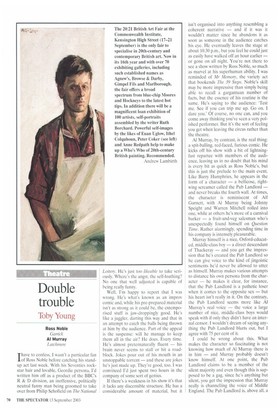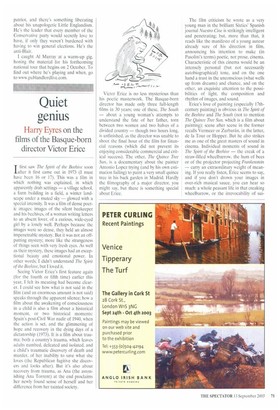Double trouble
Toby Young
Ross Noble Garrick Al Murray Latchmere
T have to confess. I wasn't a particular fan tof Ross Noble before catching his standup act last week. With his Seventies rockstar hair and lovable, Geordie persona, I'd written him off as a product of the BBC's R & D division, an inoffensive, politically neutral funny man being groomed to take over from Philip Schofield on The National
Lottery. He's just too likeable to take seriously. Where's the angst, the self-loathing? No one that well adjusted is capable of being really funny.
Well, I'm happy to report that I was wrong. He's what's known as an improv comic and, while his pre-prepared material isn't as strong as it could be, the extemporised stuff is jaw-droppingly good. He's like a juggler, darting this way and that in an attempt to catch the balls being thrown at him by the audience. Part of the appeal is the suspense: will he manage to keep them all in the air? He does, Every time. He's almost preternaturally fluent — his brain never seems to stall or hit a roadblock. Jokes pour out of his mouth in an unstoppable torrent — and these are jokes he's just made up. They're good, too. I was convinced I'd just spent two hours in the company of some sort of genius.
If there's a weakness in his show it's that it lacks any discernible structure. He has a considerable amount of material, but it isn't organised into anything resembling a coherent narrative — and if it was it wouldn't matter since he abandons it as soon as someone in the audience catches his eye. He eventually leaves the stage at about 10.30 p.m., but you feel he could just as easily have walked off an hour earlier — or gone on all night. You're not there to see a show written by Ross Noble, so much as marvel at his superhuman ability. I was reminded of Mr Memory, the variety act that bookends The 39 Steps. Noble's skill may be more impressive than simply being able to recall a gargantuan number of facts, but the essence of his routine is the same. He's saying to the audience: 'Test me. See if you can trip me up. Go on. I dare you.' Of course, no one can, and you come away thinking you've seen a very polished performer. But it's the sort of feeling you get when leaving the circus rather than the theatre.
Al Murray, by contrast, is the real thing: a spit-balling, red-faced, furious comic. He kicks off his show with a bit of lightningfast repartee with members of the audience, leaving us in no doubt that his mind is every bit as quick as Ross Noble's, but this is just the prelude to the main event. Like Barry Humphries, he appears in the form of a character — a bellicose, rightwing screamer called the Pub Landlord — and never breaks the fourth wall. At times, the character is reminiscent of Alf Garnett, with Al Murray being Johnny Speight and Warren Mitchell rolled into one, while at others he's more of a carnival barker — a fruit-and-veg salesman who's unexpectedly found himself on Question Time. Rather alarmingly, spending time in his company is intensely pleasurable.
Murray himself is a nice, Oxford-educated, middle-class boy — a direct descendant of Thackeray — and you get the impression that he's created the Pub Landlord so he can give voice to the kind of jingoistic sentiments he'd never be allowed to utter as himself. Murray makes various attempts to distance his own persona from the char
acter he makes it clear, for instance, that the Pub Landlord is a pathetic loser when it comes to the opposite sex — but his heart isn't really in it. On the contrary, the Pub Landlord seems more like Al Murray's real voice — the voice a large number of nice, middle-class boys would speak with if only they didn't have an internal censor. I wouldn't dream of saying anything the Pub Landlord blurts out, but I agree with 75 per cent of it.
I could be wrong about this. What makes the character so fascinating is not knowing how much of Al Murray there is in him — and Murray probably doesn't know himself. At one point, the Pub Landlord claims to be a member of the silent majority and even though this is supposed to be a gag, since he's anything but silent, you get the impression that Murray really is channelling the voice of Middle England. The Pub Landlord is, above all, a patriot, and there's something liberating about his unapologetic Little Englandism. He's the leader that every member of the Conservative party would secretly love to have, if only they weren't burdened with having to win general elections. He's the anti-Blair.
I caught Al Murray at a warm-up gig, honing the material for his forthcoming national tour that begins on 2 October. To find out where he's playing and when, go to www.publandlordlive.com.



























































































 Previous page
Previous page